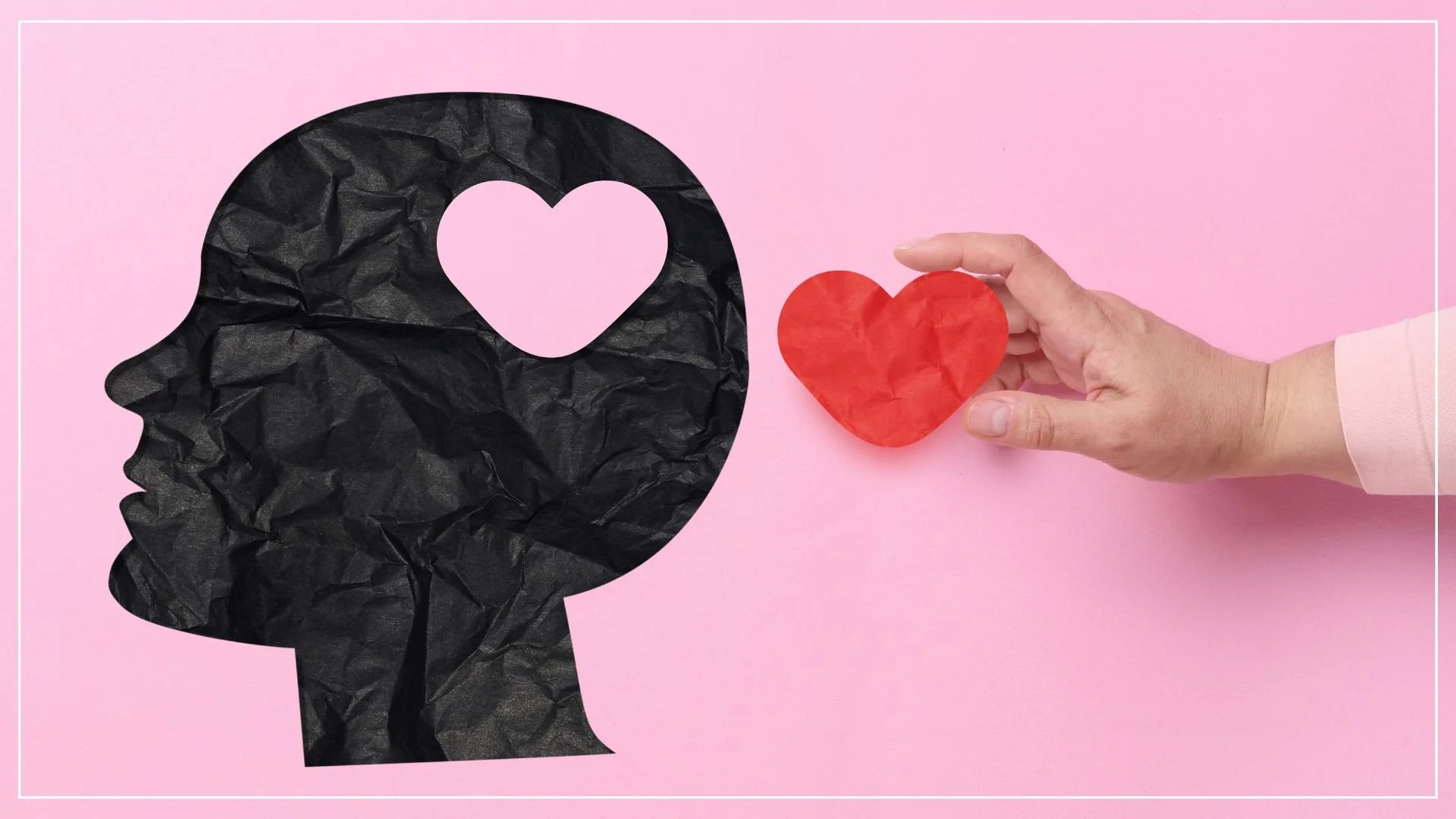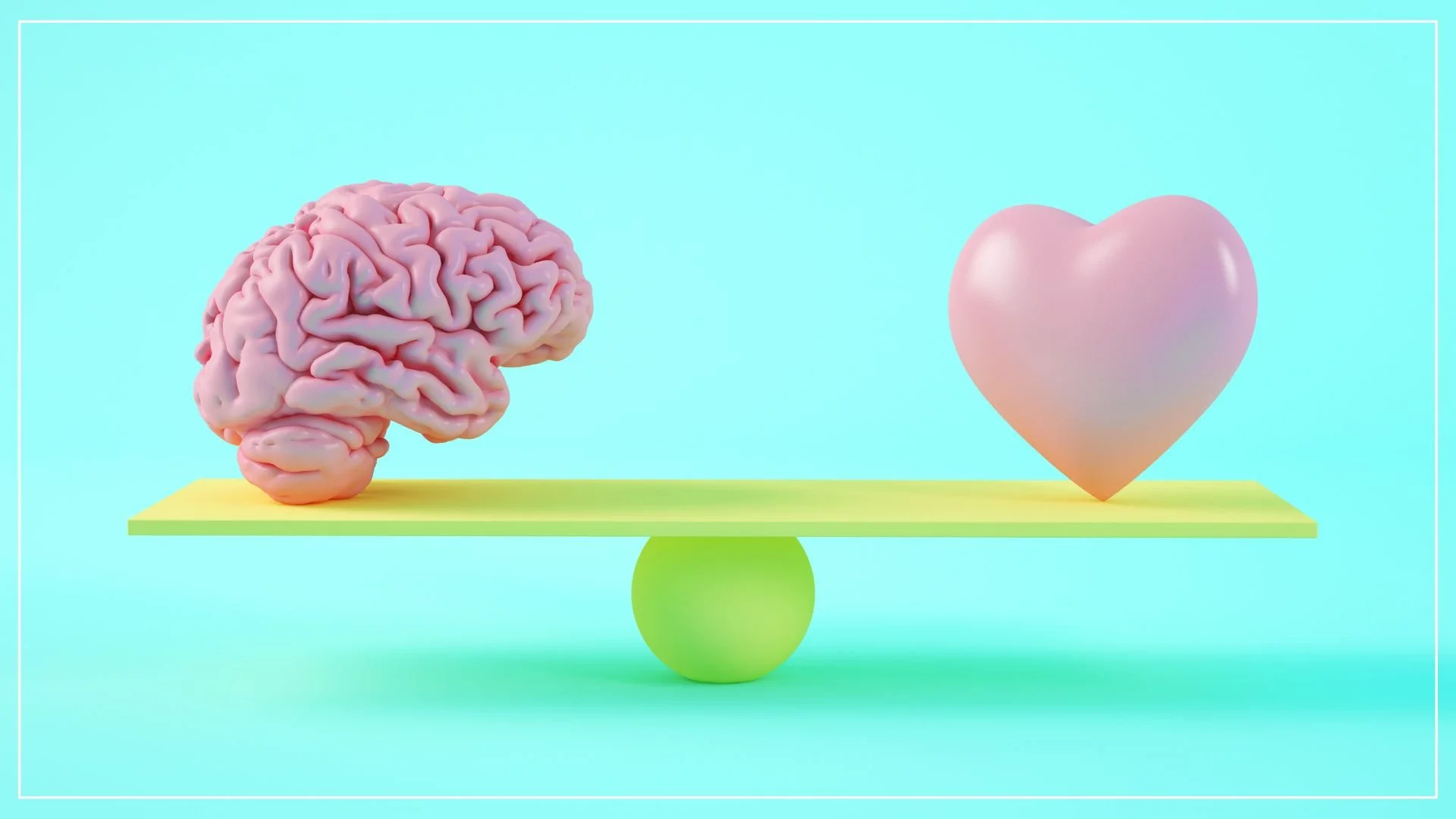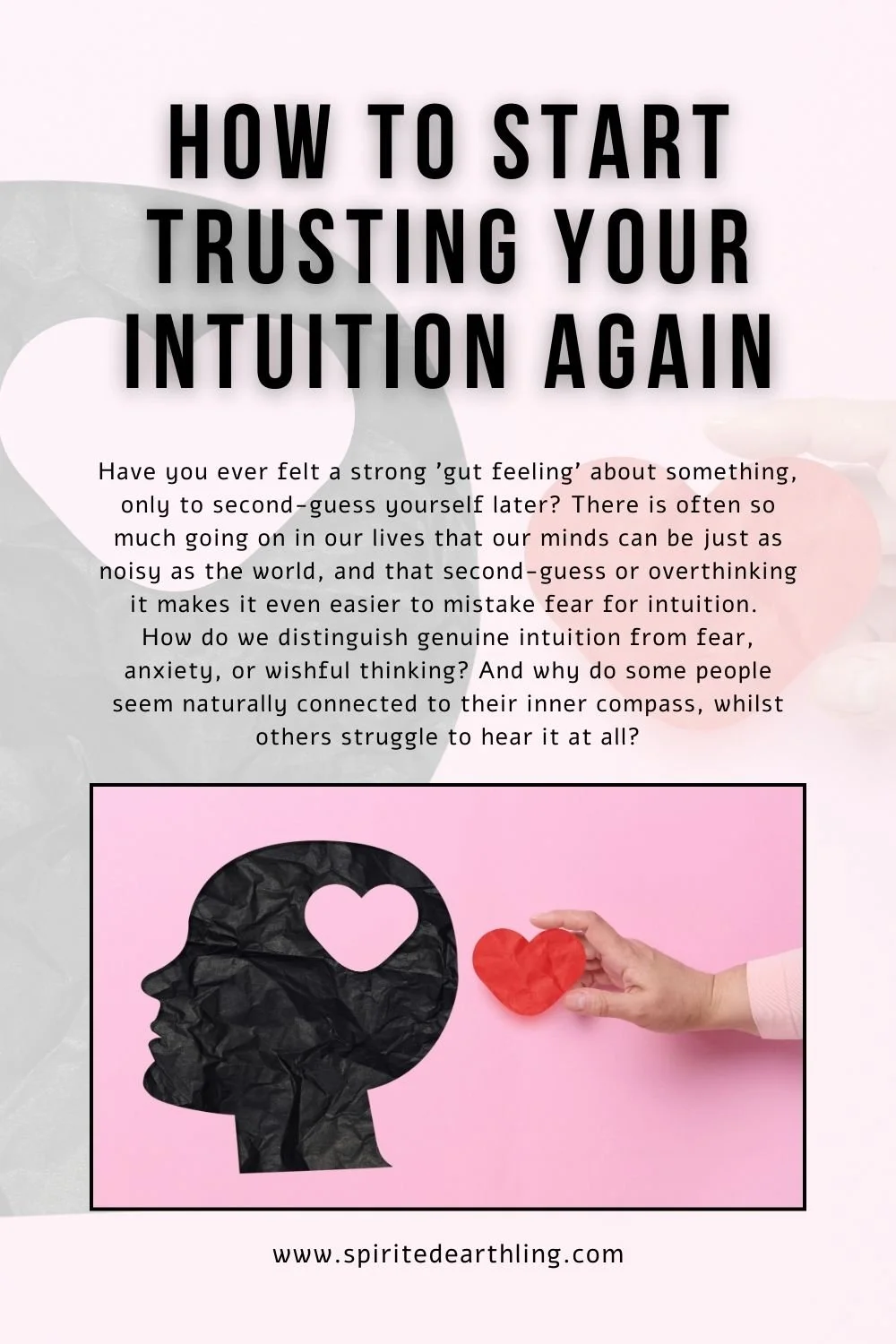How to Start Trusting Your Intuition Again
Learn how to trust your intuition again, tell the difference between fear and inner wisdom, and strengthen your inner voice with slow and intentional daily practices.
Have you ever felt a strong 'gut feeling' about something, only to second-guess yourself later? There is often so much going on in our lives that our minds can be just as noisy as the world, and that second-guess or overthinking it makes it even easier to mistake fear for intuition. How do we distinguish genuine intuition from fear, anxiety, or wishful thinking? And why do some people seem naturally connected to their inner compass, whilst others struggle to hear it at all?
Both intuition and fear want your attention, but where intuition is the whispered advice from a wise mentor, fear is a panicked well-meaning friend shouting warnings. The trick is to stop listening to the words per se and pay attention to the sensation of the feeling.
Learning to hear and trust your intuition doesn’t mean ignoring reason. Think of it more like leaning on your inner wisdom. This post is a guide on understanding what intuition really is, how to tell the difference between fear and intuition, and some calm ways to strengthen your inner voice.
What Intuition Really Is
Have you ever had that quiet nudge telling you to take a different route home, call a friend out of the blue, or say yes to an opportunity that didn’t make logical sense? That’s your intuition.
Think of intuition as your brain's brilliant background detective. Whilst your conscious mind is busy with the obvious details, your subconscious is constantly processing subtle patterns, micro-expressions, and connections between experiences. And because of this, intuition is described as a feeling (and cannot always be easily explained with logic or words). Your mind is presenting you with conclusions drawn from vast amounts of data you weren't consciously aware of collecting.
It's a bit like having an internal compass that's always picking up on magnetic fields you can't see. The guidance is real, but it comes through feeling rather than thinking. An inner knowing.
For some people, intuition shows up as a physical sensation in the body (lightness, warmth, ease). For others, it might be a quiet voice in the mind, a sudden image, or just a sense of clarity. However it arrives, it tends to feel calm, grounded, and steady.
When Fear Masquerades as Intuition
Sometimes, fear can be a convincing imposter by loudly sharing entire narratives about why something's dangerous, often referencing past hurts or imagined future disasters. Fear goes round in circles, creating that familiar mental spin cycle of ‘what-ifs’. As a voice, it is pressuring, commanding, chatty, and dramatic. It is rooted in self-protection from past experiences and doesn’t always look at present truths. Unlike fear, intuition is more matter of fact (a simple stop, go, or wait) and speaks without the panic.
The body never lies and is the reason intuition is also described as a “gut-feeling”. Fear will create contraction in your body, where your shoulders raise and tense, you may clench your jaw, breathing becomes shallower and quicker, and there is a clenching feeling in your stomach. On the other hand, intuition brings clarity even when the choice feels inconvenient. The intuitive gut-feeling feels more expansive, with a sense of relief or settling, even when it is warning you away from something.
So, here are a few gentle questions you can ask yourself when you’re unsure if you’re listening to an imposter or to wisdom:
Is this voice racing, anxious, or full of “what ifs”? Or is it quiet, steady, and simple?
Does this come from love and inner guidance, or from panic and avoidance?
Do I feel constricted and tense, or calm and clear (even if the choice feels inconvenient)?
Why Some People Struggle More Than Others
Many people have lost touch with their inner voice because they have been talked out of listening to it. In The Artist’s Way, the author shares her opinion that the western world chooses the logic brain because it was our survival brain. To see the world as known categories, and the unknown is unsafe. Logic brain is the brain we listen to be sensible.
We grew up in environments where feelings were dismissed (too sensitive, don’t be silly, this is the way it’s always been done) or perceptions were regularly invalidated, and that taught many of us to doubt our own internal radar entirely. Add onto this the seemingly ever-increasing amount of people experiencing anxiety and depression, where the voices are destructive, demeaning, and often devoid of truth.
Intuition is not pushy and so won’t try to compete with these voices, but it is still there if you are willing to listen a little deeper.
The Perfectionism Trap
One of the biggest obstacles to developing intuitive trust is the belief that intuition should work like a crystal ball, perfectly predicting outcomes. But intuition is more of a compass than a fortune-teller.
A compass tells you which direction is north, but it doesn't tell you what terrain you'll encounter on that path, whether you'll face storms, or how long the journey will take. You might have a strong intuitive sense that someone is trustworthy, and that feeling could be absolutely accurate, but it doesn't guarantee that person won't move away, or that circumstances won't change.
The perfectionists in us want to marry the logic brain so that there is a plan to follow with expected outcomes. But life happens when you're making plans. And the pressure to make perfect decisions and follow perfect plans will drown out the wisdom you’re looking for to guide decisions.
When Hindsight Becomes Harmful
Nothing destroys self-trust quite like having people point out with perfect hindsight clarity what you "should have seen." But hindsight is a completely different beast from real-time decision-making. When you're in the thick of a situation, you're working with incomplete information, managing emotions, and often trying to balance multiple competing needs.
Looking back with all the answers revealed is like reading a mystery novel backwards - of course the clues seem obvious then! This kind of post-mortem criticism, especially during vulnerable times, actually makes someone less likely to trust their instincts going forward, not more.
How to Build Your Intuitive Muscle
Developing intuition is rather like learning to ride a bike - it can't really be taught directly, it must be experienced and practised. It’s also a skill that strengthens the more you use it. Here are some ways you can strengthen your intuition:
Start Small
Begin by noticing initial impressions without pressure to act on them. What's your first response when meeting someone new? How does a particular situation feel in your body? Simply observe without judgment, and without spiralling into overthinking. Try free-writing answers to these kinds of questions without censoring yourself. Often, your deeper knowing slips through when your logical mind steps aside.
Another way to start small is to pay attention to how your body reacts to choices. A “yes” might feel open, relaxed, or expansive. A “no” might feel tight, heavy, or draining. You will begin to know the difference between nervous-excitement and trepidation.
Create Space for Both Head and Heart
When you're caught in that familiar battle between head and heart, step back entirely. Head and heart aren't meant to be adversaries. They are different instruments in an orchestra, good on their own and better together. Logic is brilliant at analysing data and spotting potential problems, whilst intuition picks up on subtler information about energy, timing, and alignment.
Give yourself a moment, give yourself some space to listen. Take a walk, have a bath, sleep and meditate on it. The wisest decisions often come when we can hold both head and heart perspectives without forcing them to agree. Sometimes the logical choice is the right one; sometimes the heart knows something the mind hasn't figured out yet. The clearest guidance often emerges when we stop straining to hear it and allow for stillness.
Reframe "Right" and "Wrong"
Instead of perfect choices, what if decisions were just... steps? Each one teaching you something, moving you forward, giving you more information about who you are and what matters to you. Failure is needed, important, and something to be embraced.
Practice Self-Compassion
Make peace with being beautifully, imperfectly human. Allow yourself to be someone who learns as they go, rather than someone who must know everything beforehand.
Keep a little record of moments when you followed your intuition and note how things unfolded. Over time, you’ll build evidence that your intuition has your back.
The Bottom Line of Learning to Trust Yourself Again
Your inner voice is there, even if it's been quiet for a while. It just needs the right conditions to flourish: less pressure, more patience, and the radical act of trusting yourself to figure things out as you go.
Always remember that your intuition is you, not something separate from you. Trusting your intuition won’t mean getting it right every time. It will give you a chance to listen, experiment, and learn. And like any muscle, it strengthens with practice. The more you practise, the more confident you’ll become in recognising your inner voice.
Have you ever had a moment where following your intuition made all the difference? I’d love to hear your stories, so share them in the comments below.
Affirmation: I trust the quiet voice within me. It always leads me where I need to be.
Connect with Spirited Earthling on your favourite social platforms and say hello 🌻
Resources for mind, body, and soul growth available in the Shop🌿


